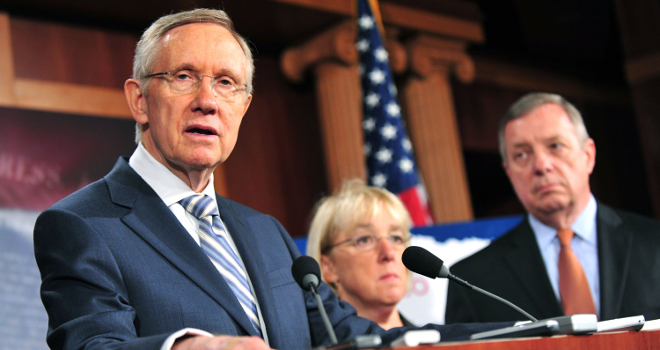It’s a staple of business management books that the Chinese character for “crisis” also stands for “opportunity.” Despite the fact that this isn’t actually true, it has also filtered into the political discourse. The S&P downgrade presents a classic crisis/opportunity situation, namely: will political leaders use this moment to bridge their differences and agree on a credible plan that involves both spending cuts and additional revenues? Or will they simply use it as a chance to say, “I told you so!” and slag off the other side? So far the signs are mixed.
The White House put out a statement by the President’s press secretary, Jay Carney, which balanced recriminations with the need to look ahead. On the finger-pointing front, he said the path to the final debt deal “took too long and was at times too divisive.”
Carney also noted that the President had “pushed for a grand bargain” that would achieve “substantial deficit reduction through both long-term entitlement changes and revenues through tax reform.” He was polite enough not to point out that the Republicans walked away from this deal, under pressure from tax-hawk House members who felt closing off tax loopholes was too much like creating new taxes.
Steve Israel, chair of the Democratic Congressional Campaign Committee, was less restrained. In a blistering statement he slammed the Tea Party-leaning members of the Republican House as “Roadblock Republicans.” Rep. James Clyburn (D-SC), the Assistant Democratic Leader, was similarly vehement. He savaged the Republicans for having “repeatedly walked away from the negotiating table whenever the two sides got close to a balanced blend of both spending cuts and revenue raisers.”
House Speaker John Boehner (R-OH) came out with a press release that — not surprisingly — made no mention of his abandonment of the grand bargain talks. By his account:
“The Administration and Democrats in Congress had sought an increase in the debt limit without any spending cuts or reforms. Republicans made clear the American people would not tolerate that and fought for the largest spending cuts possible. With the Budget Control Act, we made a positive first step toward reducing the debt, but much more must be done.”
Boehner’s statement also failed to mention that the S&P report had highlighted Republican intransigence over new tax revenues as one major reason for the downgrade.
Senate Majority Leader Harry Reid (D-NV) revived the Democratic push for the tax reforms President Obama was mooting during the grand bargain discussions. Reid’s statement called for revenue-raising measures like “closing tax-payer funded giveaways to billionaires, oil companies and corporate jet owners.”
Reid and Carney’s press releases both looked ahead to the “super-committee” that was established as part of the resolution to the debt ceiling debate. The commission is tasked with finding an extra $1.5 trillion worth of cuts, with the warning that there will be automatic across-the-board slashing if they fail to agree or Congress does not adopt their plan.
There has already been wrangling over who is going to be put on this committee. Reid said the downgrade made it even more imperative that party leaders do not appoint “hardliners who have already ruled out the balanced approach that the markets and ratings agencies like S&P are demanding.” Carney echoed this, saying that over the coming weeks the President will encourage the committee “to put our common commitment to a stronger recovery… above our political and ideological differences.”
How the committee functions in the coming weeks will certainly be an important test. However, even if it does meet its stated aims it’s unclear how far this will sway the credit agencies’ judgments. S&P’s report suggested a successful result from the committee would just be one of several factors that could lead them to judge America’s new AA+ rating as “long-term stable,” rather than “outlook negative.”
So, though political brinksmanship over the debt ceiling spooked the credit agencies and helped bring about the downgrade, a sudden outbreak of happy-clappy bipartisan rhetoric will not in itself resolve the mess. The Financial Times quoted S&P’s managing director, John Chambers, as saying “There are two things that we should emphasize. One is that the political discourse has diminished the credit standing of the United States. The other is a fiscal analysis.”
In other words, though the way political leaders talk and bargain over the coming weeks will be of significance, it’s the long-term structural issues that will be key. These, of course, seem extremely intractable; hence this turmoil happening in the first place. Regaining that AAA rating could yet be some way off.









